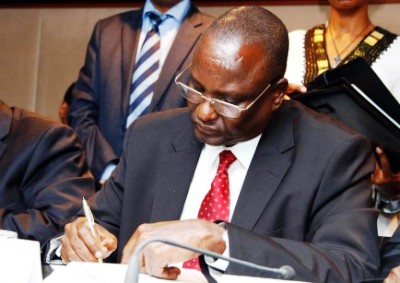SPLM-IO warns of peace failure over army cantonment dispute
March 10, 2016 (JUBA) – South Sudan’s armed opposition faction, SPLM-IO, has warned that the disagreement between the government and the opposition faction over cantonment areas of troops in Equatoria and Bahr el Ghazal regions may “derail” the implementation of the peace agreement.

The position of the government is that the cantonment areas be confined to the states of Upper Nile region, saying there are no opposition fighters in Equatoria and Bahr el Ghazal in order to consider them for the arrangement.
Bu Taban Deng Gai, the chief negotiator for the SPLM-IO and head of the advance team in Juba, said the stalemate over the matter may derail the peace agreement. He proposed that regional heads of state and government should intervene.
“I want the public to know that this is a problem that may delay peace and may derail this peace. It may actually harm this peace process implementation,” said Deng, speaking to reporters after a meeting of the Joint Monitoring and Evaluation Commission (JMEC) on Wednesday.
According to the peace agreement signed in August 2015, there should be cantonment areas for rebels and government forces where they will be trained for a period of at least 18 months before reunification.
Information minister and acting leader for government team, Michael Makuei Lueth, said there are no SPLA-IO forces in Equatoria and Bahr el Ghazal.
“The government position is that these people (in Equatoria and Bahr eL Ghazal) are not included in the agreement because the agreement says ‘all those who were previously in combat are the ones that will be affected by the agreement,” said Makuei, speaking beside Deng at the same briefing to reporters late on Wednesday in Juba.
Makuei argued that there was no fighting in Equatoria and Bahr el Ghazal when the peace agreement was signed six months ago, and that only a handful of individual politicians from Equatoria and Bahr el Ghazal joined the SPLM-IO with no forces on the ground to fight.
He said some of them started to organize to fight only after they knew that the peace agreement was already signed, adding they don’t qualify to be part of the SPLA-IO army.
“And anybody who started fighting after the agreement will not be considered as a combatant who will benefit from the cantonment,” he added.
Instead, he said, the JMEC and permanent ceasefire monitors will decide together with the parties to the agreement the next course of action. But he admitted that “it will be difficult to fully observe permanent ceasefire without agreement on cantonment areas.”
SPLM-IO senior leader present in Juba, Deng, said that there was need to establish cantonment areas across the country.
“We should agree that there must be cantonment for the forces in the whole of the country. This is interest of everybody. Is interest of the government, is interest of the people of South Sudan,” he said.
Deng said there is another “obstacle” delaying the formation of transitional government of national unity, explaining that Troika countries have refused to transport to Juba heavy weapons carried by the opposition forces.
“The Troika that has money and the EU [say] that they can only transport persons with light weapons like AK47 [Kalashnikov]. But they will not transport large machine guns like PKM or RPG 7,” he said, referring to the United States, Britain and Norway – the Troika countries that have offered to transport SPLM-IO forces to Juba ahead of arrival of first vice president designate, Riek Machar.
“There is a commitment from the donors that they can transport these forces without their organic weapons – which is a problem now,” he added.
The Wednesday JMEC meeting agreed that the government will ferry SPLA in opposition to Malakal from Kaldak, a few kilometres south of the Upper Nile state capital.
No date has been agreed to transport the first phase of troops, which numbers 1,370 .
(ST)
